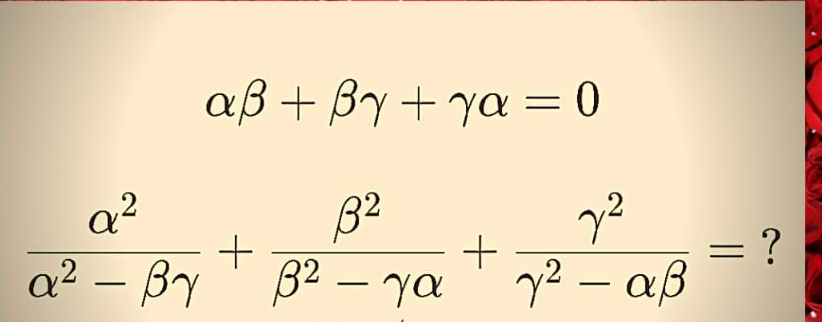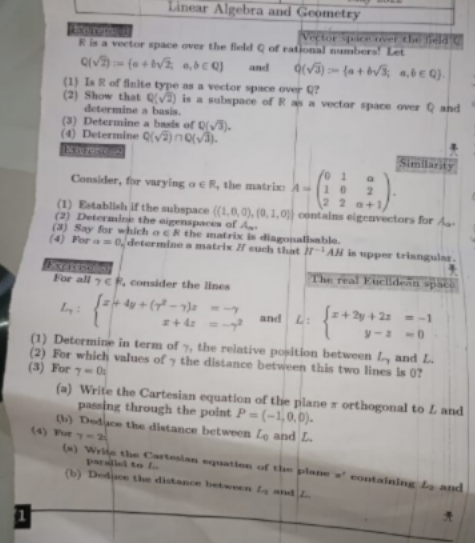
|
|

|
All Questions Topic List |
AllQuestion and Answers: Page 444 |
Question Number 169664 Answers: 1 Comments: 0
|
| Given that n(A)=10 and n(B)=6
i) what is the largest possible of
n(A∪B)
ii) what is the smallest possible value
of n(A∪B)
iii) what is the smallest possible value
of n(A∩B)
|
|
Question Number 169658 Answers: 1 Comments: 2
|

|
Question Number 169655 Answers: 1 Comments: 0
|

|
Question Number 169654 Answers: 2 Comments: 0
|
| ∫_0 ^1 ((3x^3 −x^2 +2x−4)/( (√(x^2 −3x+2)))) dx = ?
|
|
Question Number 169653 Answers: 1 Comments: 0
|
|
solve for x
x^2 + (x^2 /((x+1)^2 )) = 3
|
|
Question Number 169650 Answers: 0 Comments: 1
|
|
f(x)= 3∣ sin(x)∣ −4∣cos(x)∣
R_( f) =?
|
|
Question Number 169646 Answers: 0 Comments: 0
|
| If f(x)=[(x^(2x^4 ) /(x^x^2 +3))] then what will be the unit digit of f(10)?
|
|
Question Number 169640 Answers: 0 Comments: 1
|
| ∫cos(x^7 )dx =
|
|
Question Number 169635 Answers: 1 Comments: 1
|
| lim_(x→−3) (((√(x^2 +7))+(√(25−x^2 ))−8)/( (√(−3x))−6+(√(18+3x)))) =?
|
|
Question Number 169631 Answers: 1 Comments: 4
|

|
Question Number 169620 Answers: 0 Comments: 3
|

|
Question Number 169626 Answers: 1 Comments: 0
|

|
Question Number 169613 Answers: 0 Comments: 3
|

|
Question Number 169612 Answers: 1 Comments: 0
|
| Differentiate w.r.t ′x′
x^y +y^x =c
Mastermind
|
|
Question Number 169610 Answers: 1 Comments: 0
|

|
Question Number 169600 Answers: 3 Comments: 2
|
| give : x,y,z∈R
x+y+xy=8
y+z+yz=15
z+x+zx=35
⇒x+y+z+xyz=?
|
|
Question Number 169585 Answers: 1 Comments: 2
|

|
Question Number 169582 Answers: 0 Comments: 0
|

|
Question Number 169579 Answers: 0 Comments: 0
|

|
Question Number 169569 Answers: 1 Comments: 0
|
|
f(x) = x −⌊(x/2)⌋−⌊(x/3)⌋−⌊(x/6)⌋
R_( f) = ?
|
|
Question Number 169709 Answers: 0 Comments: 1
|

|
Question Number 169708 Answers: 0 Comments: 0
|

|
Question Number 169565 Answers: 0 Comments: 1
|
| lim_(x→0) ((a^(sinx) −c^(sinx) )/(m^(sinx) −n^(sinx) ))=?
∀{a,c,m,n}∈[0,∞]
|
|
Question Number 169563 Answers: 0 Comments: 1
|

|
Question Number 169559 Answers: 1 Comments: 1
|

|
Question Number 169558 Answers: 3 Comments: 0
|
| (dy/dx) = ((2x−y+1)/(x−4y+3))
|
|
Pg 439
Pg 440
Pg 441
Pg 442
Pg 443
Pg 444
Pg 445
Pg 446
Pg 447
Pg 448
|
Terms of Service |
Privacy Policy |
Contact: info@tinkutara.com |




























